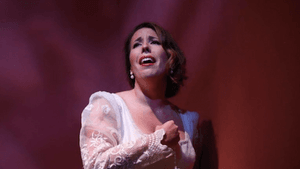Stay in the Loop
BSR publishes on a weekly schedule, with an email newsletter every Wednesday and Thursday morning. There’s no paywall, and subscribing is always free.
Devilishly good
Academy of Vocal Arts presents Anton Rubinstein's 'The Demon'

This month, the Academy of Vocal Arts (AVA) staged Anton Rubinstein’s The Demon. Rubinstein was a Russian composer from the generation before Tchaikovsky, whose symphonies, concerti, and operas preceded and influenced what Tchaikovsky wrote.
The musical director and pianist for this production was Ghenady Meirson, a native of Odessa who teaches Russian opera at AVA and also at the Curtis Institute of Music. He also led a concert version of The Demon in 2015 with his Russian Opera Workshop. The difference this time is that the cast comes from the roster of AVA resident artists — many of whom already have professional careers — and the production was staged (by Meirson, principally with projections) and costumed (by Valerie Starr).
Until recently, Russian operas were rarely performed in America. Before the end of the Cold War, the only pieces you were likely to see were Mussorgsky’s Boris Gudonov, which was sung in Italian at the Metropolitan Opera, and Tchaikovsky’s Eugene Onegin which was done there in English. In recent decades, other pieces by Tchaikovsky have been performed (now using the original Russian language), and the Met has staged 20th-century Russian operas by Shostakovich and Prokofiev.
Based on a poem by Mikhail Lermontov that tells of the struggle between Mefistofeles and God, the titular character is a fallen angel. He seduces Tamara, a pure and religious young woman. Bored with creating floods and hurricanes to kill people, he yearns for passion. When she succumbs to him, she dies and is lifted to heaven, leaving the Demon eternally alone.
A devil of a role
Playing the Demon presents great challenges and opportunities. The character has a succession of monologues, several big arias, and a final-act duet where he and Tamara fight for posession of her soul. Three baritones sang the role during the AVA’s three-performance run. I saw and heard Christopher Kenney who displayed a silky high-baritone voice. Ethan Simpson and Timothy Renner sang the other performances.
As his first step in seducing Tamara, the Demon arranges the murder of her fiancé. Then he tells her how much he relates to her loss. One of the fascinations of this opera is that when he’s wooing Tamara, we almost sympathize with him and his sorrowful pleas. However, once she gives in, he boasts that he has won, and is ruler of the domain.
Rebecca Gulinello was an attractive Tamara, a striking presence with a huge voice; it sounds more lyric than dramatic, but with a solid core and much thrust. John Matthew Myers played Tamara’s betrothed sympathetically, with a strong yet tender voice. Two basses provided solid underpinning: Daniel Noyola played Tamara’s father and Andre Courville, a servant. Hannah Ludwig and Alejandra Gomez were lower-voiced, strong supporting players.
Rare treats
The opera contains some choruses that were cut to reduce running time. The remaining choral passages were sung by AVA singers who normally perform leading roles, and their harmonies added greatly to the impact. It was an embarrassment of riches to hear 11 offstage nuns sung by women who appear as stars in other operas.
Act III is almost entirely a duet between the Demon and Tamara as he tries to win her love. The ending is a quiet and lovely chorus that welcomes her to heaven. It is much more affecting than the bombastic finales composed by Gounod and Boito for their operas about the devil.
This production was a worthwhile enterprise, and should be an inspiration to other companies. The Met apparently thought of it as a potential starring vehicle for the great Dmitri Hvorostovsky, who is currently battling a brain tumor. And yet, some patrons, and Philadelphia Inquirer critics, choose to not attend these AVA operas because they don’t have an orchestra. It’s their loss. I’ve seen revealing productions of Debussy’s Pelleas et Melisande and Strauss’s Arabella at AVA with piano accompaniment, to give just two examples. Because of its rarity, The Demon was even more rewarding.
What, When, Where
The Demon. By Anton Rubinstein. Ghenady Meirson conducted and directed. December 10-15, 2016 at the Academy of Vocal Arts, 1930 Spruce Street, Philadelphia. (215) 735-1685 or avaopera.com.
Sign up for our newsletter
All of the week's new articles, all in one place. Sign up for the free weekly BSR newsletters, and don't miss a conversation.

 Steve Cohen
Steve Cohen